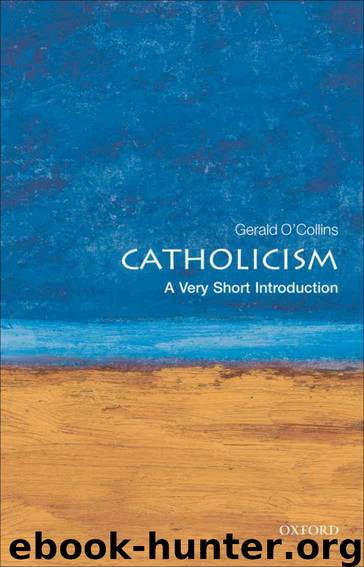Catholicism: A Very Short Introduction (Very Short Introductions) by O'Collins Gerald

Author:O'Collins, Gerald [O'Collins, Gerald]
Language: eng
Format: mobi, epub
Publisher: Oxford University Press
Published: 2008-11-26T16:00:00+00:00
Christ as fulfilment
The life of glory that the life of grace initiates is centred on the final coming of Christ in glory, the ultimate gift of God to human beings. Catholics have traditionally spoken of the ‘last things’, the first being death itself. A specifically Catholic understanding of death can be gleaned primarily from the rites for the dying, from prayers written for Masses on behalf of the deceased, from burial rites, and from inscriptions on tombs. The conviction that ‘life is changed, not taken away’ characterizes this attitude towards death. Catholics (and other Christians) face death with a hope centred on the risen and living Christ. At funeral Masses, the presence of the great Easter candle near the coffin illustrates this hope. Christ, who has been the dead person’s light and life since baptism, will continue to be that light now that the deceased is born into never-ending life.
With death, the history of each person assumes its complete, irreversible character, and is ‘judged’ by God in what came to be called the ‘particular judgement’. At death, individuals know their condition in relationship with God. But are they all ready for the face-to-face vision of God that will bring them eternal happiness? Realizing that many deceased needed first to be cleansed (through Christ’s merits) from the effects of their sins in a state that would be called ‘purgatory’, from early times Christians prayed to God for the dead and celebrated the Eucharist for them. On her deathbed, St Monica (d. 387) asked Augustine and her other son to ‘remember her at the altar of God’.
After such post-mortem purification (or immediately, if this is not needed), those who die in the love of God are gifted with an immediate and eternal vision of the tripersonal God. They dwell with God and enjoy the utterly fulfilling vision of the infinitely good and beautiful God. As the 1992 Catechism of the Catholic Church puts it, there will be ‘the blessed community of all who are perfectly incorporated in Christ’ (no. 1026).
If such glory awaits the blessed in heaven, what of people who definitively close themselves to God’s saving love? Hell (as a state of permanent and painful separation from God) remains a possibility for those who through deliberate malice refuse to love God and their neighbour (see Matt. 25: 31–46). With death their choice is sealed forever. But, as John Paul II taught (in 1999), one does not know ‘whether or which human beings are found in hell’. Catholics (and other Christians) may and should pray that this terrible possibility will never be realized for anyone. Jesus left terrifying warnings about the possible outcome of serious sin. Yet Catholics may hope that the divine purpose to save everyone will be effective (1 Tim. 2: 3–6) and that, finally, God will be ‘all in all’ (1 Cor. 15: 28).
When Jesus comes in glory at the ‘general judgement’, the whole of humanity will definitively know the truth about itself. Through the resurrection of the dead,
Download
Catholicism: A Very Short Introduction (Very Short Introductions) by O'Collins Gerald.epub
This site does not store any files on its server. We only index and link to content provided by other sites. Please contact the content providers to delete copyright contents if any and email us, we'll remove relevant links or contents immediately.
| Buddhism | Christianity |
| Ethnic & Tribal | General |
| Hinduism | Islam |
| Judaism | New Age, Mythology & Occult |
| Religion, Politics & State |
Cecilia; Or, Memoirs of an Heiress — Volume 1 by Fanny Burney(31341)
Cecilia; Or, Memoirs of an Heiress — Volume 3 by Fanny Burney(30938)
Cecilia; Or, Memoirs of an Heiress — Volume 2 by Fanny Burney(30896)
The Secret History by Donna Tartt(16644)
Sapiens: A Brief History of Humankind by Yuval Noah Harari(13067)
Leonardo da Vinci by Walter Isaacson(11912)
The Radium Girls by Kate Moore(10914)
Sapiens by Yuval Noah Harari(4546)
The Wind in My Hair by Masih Alinejad(4427)
How Democracies Die by Steven Levitsky & Daniel Ziblatt(4407)
Homo Deus: A Brief History of Tomorrow by Yuval Noah Harari(4287)
Endurance: Shackleton's Incredible Voyage by Alfred Lansing(3852)
The Silk Roads by Peter Frankopan(3771)
Man's Search for Meaning by Viktor Frankl(3644)
Millionaire: The Philanderer, Gambler, and Duelist Who Invented Modern Finance by Janet Gleeson(3574)
The Rape of Nanking by Iris Chang(3522)
Hitler in Los Angeles by Steven J. Ross(3443)
The Motorcycle Diaries by Ernesto Che Guevara(3340)
Joan of Arc by Mary Gordon(3262)
